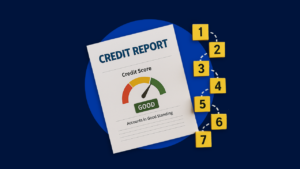Can you use AI for credit repair?

Americans’ use of artificial intelligence (AI) is slowly expanding: According to a recent Pew Research survey, nearly one-quarter of U.S. adults (23 percent) say they’ve tried the AI chatbot ChatGPT. If you’ve experimented with similar tools, you may wonder if it’s worth using AI to improve your credit.
AI credit repair doesn’t work the same way as professional services, such as credit repair companies or credit counselors, but it may be a good option for some people. Understanding how AI vs. professional credit repair works can help you make an informed decision.
How AI credit repair works
Consumers interested in AI credit repair may turn to any of the popular chatbots on the market, including Open AI’s ChatGPT, Google’s Gemini, Microsoft’s Copilot or Anthropic’s Claude. Each works essentially the same way. You provide instructions, and the model generates a reply based on its training data.
AI chatbots will not obtain copies of your credit reports or file disputes with the credit bureaus on your behalf. Instead, they can help you manage the process on your own. For example, you might ask an AI chatbot to:
- Describe how to get free copies of your credit reports.
- Explain how to read your credit report.
- Give examples of common credit report errors to watch out for.
- Guide you through the process of disputing credit report errors.
- Provide sample dispute letters you can send to the credit bureaus.
- Recommend credit-building products, such as secured credit cards.
- Suggest an action plan to improve your credit history or get your finances on track.
In addition to the AI chatbots that consumers can use, some companies claim to offer AI-powered credit repair services. These services may include using AI to automate parts of the credit repair process, such as reviewing credit reports, identifying errors and submitting disputes.
Pros and cons of AI credit repair
If you’re interested in repairing your credit with AI, you should consider a few pros and cons before getting started.
Pros
- Free or low cost: If you’re on a tight budget, the low cost of AI credit repair options is a major pro. Some of the popular AI chatbots are free to use, according to a recent PC Mag product roundup, while others have relatively low monthly fees. For AI-powered credit repair services, the cost will vary depending on the company you choose.
- DIY process: Whether you use an AI chatbot or an AI-powered service, AI credit repair is largely a do-it-yourself process. The AI tools can provide education and support to help you on your credit repair journey, but you’re still in control of which credit repair strategies you use, when you file disputes and how you communicate with the credit bureaus.
- No commitment: Traditional credit repair services may require customers to sign a month-to-month contract, including a mandatory notice period if they want to cancel. Some AI options, like the free chatbots, don’t require any commitment. That gives you the flexibility to end your credit repair journey at any time if you’re not seeing results.
Cons
- Inaccurate information: Artificial intelligence is not always reliable. If there are errors in an AI’s training data, it might provide wrong or misleading information about credit repair. Sometimes, AI tools will even hallucinate inaccurate information that isn’t based on their training data, according to IBM. If you get the wrong information from an AI tool, you could waste time on ineffective credit repair tactics.
- Lacks personalization: Each person’s credit history and credit challenges look a little bit different. AI tools can generate a step-by-step plan to repay debt or dispute credit report errors, but they won’t necessarily be able to consider the nuances of your actual situation.
- Data privacy risks: Artificial intelligence has the potential for significant privacy risks. Users don’t have control over how their data is used, and there is a risk of sensitive information being exposed, warns the International Association of Privacy Professionals. Avoid giving AI any personal information, such as your address, Social Security number or account numbers.
How professional credit repair works
Professional credit repair services are an alternative to taking a DIY approach with the help of AI tools. If you get professional help, your options include hiring a credit repair company or getting credit counseling.
Credit repair companies offer to clean up the inaccurate, incomplete or outdated information on your credit reports in exchange for a fee. They act as a middleman between you and the credit bureaus, handling tasks like:
- Requesting copies of your credit reports from the three credit bureaus.
- Reviewing your credit reports for errors, like incorrectly reported payments.
- Submitting disputes to the credit bureaus to get the errors fixed.
Credit counseling organizations are another source of professional assistance. Credit counselors assess your individual situation and help you create an action plan to get your finances back on track. This could be helpful if your score is low for legitimate reasons, rather than because of credit report errors.
Pros and cons of credit repair services
Turning the credit repair process over to a professional has its own pros and cons to consider.
Pros
- Expert help: Credit repair professionals, including credit counselors and credit repair companies are trained to help people improve their credit histories. With their knowledge and experience, they can identify the factors that are lowering your score and recommend effective strategies for improvement.
- Save time: Repairing your credit history on your own can be time consuming and tedious, even if you use AI for parts of the process. Professional credit repair services do the legwork for you, saving time and effort. Their expertise could also help you get a faster resolution of your credit issues.
- Personalized to you: While AI credit repair approaches lack nuance, credit repair professionals can take the time to understand your individual credit challenges and create a strategy tailored to your specific needs.
Cons
- Involves fees: You can expect to pay various fees if you hire a professional, though the actual costs will vary. For ongoing services, the best credit repair companies charge subscription fees ranging from around $50 to $150 per month. Credit counselors may also charge fees for their services.
- Risk of scams: There are many legitimate credit repair professionals, but unfortunately, there are also scammers who prey on people who want to fix their credit. You’ll need to vet credit repair offers before signing up for services. Watch out for companies that demand upfront payments or make promises that seem too good to be true.
- Less control: When you hire a credit repair professional, you give up control of certain aspects of your credit repair journey. You rely on the company for tasks like reviewing your credit report, communicating with the credit bureaus or monitoring your credit. You won’t necessarily know what’s going on behind the scenes of the credit repair process.
Which one is right for you?
To decide whether you should hire a credit repair professional or use AI for credit repair, consider the pros and cons of both options. Some of the factors to keep in mind as you make your decision include:
- Budget: Review your monthly budget to determine how much you can spend on credit repair. If money is tight, choosing a free or low-cost AI option might make sense.
- Comfort level with AI: According to a recent YouGov survey, 45 percent of Americans don’t trust AI to provide accurate information. You’ll likely prefer professional credit repair services if you’re in this group.
- Knowledge of credit repair: People with a solid understanding of credit repair may feel comfortable using AI to make the process more efficient, while those who are less familiar with the process may prefer the guidance of a professional.
- Individual credit issues: People who only have a few minor errors on their credit reports may feel confident turning to AI for help. Those with more complex issues may prefer support from a professional.
The bottom line
Artificial intelligence, from popular chatbots to AI credit repair engines, is giving consumers more options for fixing their credit. While these newer options can be a good choice for some people, they’re not right for everyone. If you have complicated credit issues or prefer not to use AI tools, hiring a credit repair company likely makes sense.
Why we ask for feedback Your feedback helps us improve our content and services. It takes less than a minute to complete.
Your responses are anonymous and will only be used for improving our website.






